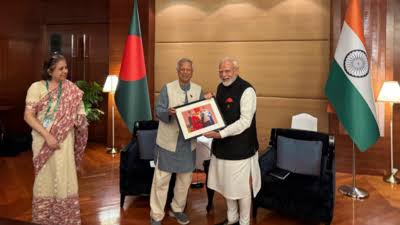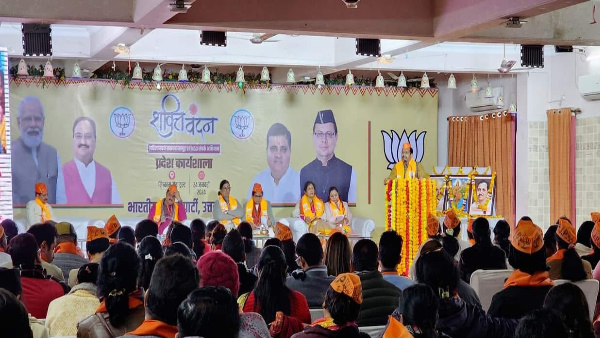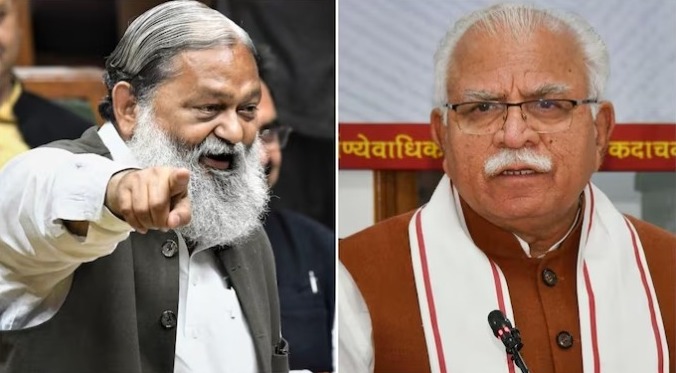In a long-awaited and symbolic meeting, Prime Minister Narendra Modi and Bangladesh’s interim chief advisor Muhammad Yunus came face-to-face for the first time since the political upheaval in Dhaka that led to Sheikh Hasina’s flight to India. The two leaders met in Bangkok on Friday, on the sidelines of the sixth BIMSTEC Summit, marking a cautious but potentially significant step toward restoring bilateral dialogue.
 This meeting follows months of growing tension between the two neighboring nations. Relations have been strained since former Prime Minister Sheikh Hasina sought asylum in India in August 2024, following a widespread, youth-led uprising that brought her 16-year rule under the Awami League to an abrupt end. Her departure triggered political instability in Bangladesh and left a void that the interim government under Yunus has struggled to fill.
This meeting follows months of growing tension between the two neighboring nations. Relations have been strained since former Prime Minister Sheikh Hasina sought asylum in India in August 2024, following a widespread, youth-led uprising that brought her 16-year rule under the Awami League to an abrupt end. Her departure triggered political instability in Bangladesh and left a void that the interim government under Yunus has struggled to fill.
Adding to the discomfort between the two sides have been concerns raised by India over incidents of violence against Hindu minorities in Bangladesh, and controversial remarks made by Yunus about India’s northeastern states during a recent appearance at the Boao Forum in China. These developments created a diplomatic chill that many feared could damage the historically close and culturally intertwined relationship between the two countries.
Despite the tension, there have been signs of behind-the-scenes efforts to mend ties. Bangladesh had formally requested a bilateral meeting ahead of the BIMSTEC Summit, but it initially did not appear on Prime Minister Modi’s official itinerary. However, the two leaders were seen seated together at a summit dinner the night before, a subtle but telling gesture that paved the way for Friday’s talks.
During the meeting, Prime Minister Modi reportedly reiterated India’s commitment to peace, stability, and mutual respect. In a letter to Yunus last month, he had emphasized India’s readiness to work with Bangladesh to strengthen their partnership, grounded in shared aspirations and sensitivity to each other’s concerns.
For its part, the interim Bangladeshi government has maintained that it sent official requests to New Delhi for Sheikh Hasina’s extradition to face trial in Dhaka. India, however, has not issued a formal response, a silence that speaks volumes about the complex emotions and political considerations at play.
The meeting in Bangkok, while brief, carried emotional weight. It was more than just a diplomatic formality—it was a reminder of the fragility of regional peace and the importance of dialogue in turbulent times. The people of both nations have long shared bonds of language, history, and struggle. As their leaders take these tentative steps toward rebuilding trust, many hope it will lead not only to political clarity but also to healing.
Held under the aegis of BIMSTEC—a grouping of seven South and Southeast Asian countries—the summit itself was a timely backdrop for the Modi-Yunus meeting. With 1.73 billion people and a combined GDP of over $5 trillion, the region’s future depends heavily on cooperation and goodwill among its members. As Thailand chaired this crucial session, the warmth—or chill—between India and Bangladesh remained a central point of attention.
In these uncertain times, dialogue is not just diplomacy—it is a duty. And for the millions who cherish peace across the India-Bangladesh border, Friday’s meeting offered a small but meaningful ray of hope.



